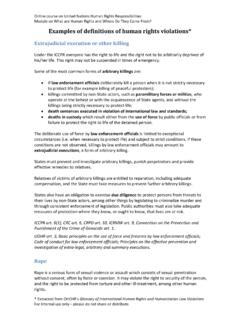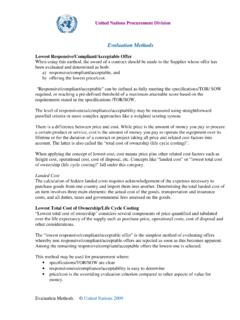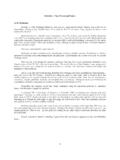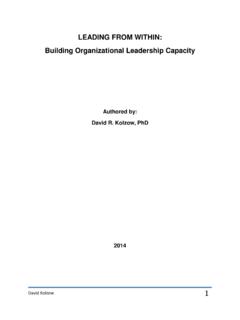Transcription of Module 4 Vulnerabilities - United Nations
1 Module 4: Vulnerabilities Vulnerable people The largest group of people vulnerable to HIV are women (this includes women in ongoing heterosexual relationships and even in a marriage context.). There are both biological and social factors which contribute to women's vulnerability to HIV. An estimated one in three women worldwide will be raped, beaten, coerced into sex, or otherwise abused in her lifetime. Violent intercourse may result in injury which can lead to HIV transmission. In South Africa, research found that nearly one in seven new infections could have been prevented if the women had not been subjected to physical or sexual abuse. Women who are economically dependent on their male partners or women of lower economic status may not be able to insist on condom use.
2 Women and girls may sometimes engage in transactional sex with men, exchanging sex for money or other material goods such as, for example, school fees, rent, food, gifts or drugs. Women are also increasingly infected through their sexual partners engaging in drug use, or male to male sex, and through migrant workers having sex with others while working away. Child marriage can result in the young woman being exposed to health risks related to pregnancy and childbirth, including illness, injury and even death, as well as the risk of HIV. Other vulnerable groups Sex workers and their clients. People who inject drugs. Men who have sex with men. People who work in stressful environments (including UN workers). Vulnerability of UN staff UN employees are at risk of being infected with HIV, or even at a higher risk, because we sometimes: Live in remote and emergency situations.
3 Live far away from our families, often for long periods of time. Are exposed to long periods of stress. Travel frequently, far from our family and home. Live in places with high HIV prevalence or high rates of sexual violence. Have high risk of being involved in a car accident, and therefore of being in need of a blood transfusion. May use alcohol or drugs as a means to reduce stress. May not be able to negotiate safer sex. HIV in remote locations and working safely Be informed. Carry & use condoms. Carry sterile disposable needles and syringes for your personal use. Locate best medical facilities. What to do in case of exposure to HIV PEP Starter Kits PEP stands for Post-Exposure Prophylaxis . It is an emergency medical response that can be used by people who have recently been exposed to HIV to decrease their chances of becoming infected.
4 PEP is provided for use in case of sexual assault, occupational exposure ( : needle stick injury), criminal assault or other security incident. Seeing a physician to be assessed for use of PEP, you would also receive needed care for injuries, prevention of unwanted pregnancy, other sexually transmitted infections and more. PEP starter kits can also be used in the event of other types of potential exposure to HIV, if the treatment cannot be accessed through local medical services. Carry an awareness card, and write on it the contacts of the PEP starter kit custodians in your duty station. Standard Precautions Factsheet for Body Fluids Standard precautions are based on the assumption that all body fluids can carry blood- borne diseases; it is important to protect yourself against any infections via bacteria or viruses.
5 Here are some rules everyone should follow: Cover cuts If you have cuts or open sores on the skin, they should be covered with a plastic bandage. Wash your hands Hands should be washed with soap and hot water after contact with blood or other body fluids, after going to the bathroom, before preparing or eating food, and after removing latex gloves. Clean up Spills of blood or other body fluids should be cleaned up with a fresh mixture of household bleach (1 part) and water (9 parts). Paper towels should be used and disposed of in a plastic garbage bag. Remember to wear latex gloves when cleaning up. Wear latex gloves Gloves should be worn once and disposed of in a plastic garbage bag. Small plastic bags may be used instead of gloves if necessary.
6 While gloves are highly recommended, keep in mind that intact skin is an excellent barrier against HIV, as the virus cannot penetrate the skin unless there is an open wound. If the skin is exposed to blood, wash it as soon as possible with soap and hot water. Wash clothes Soiled items should be stored in sealed plastic bags. Wash soiled clothing separately in hot soapy water and dry it in a hot dryer, or have it dry-cleaned. Dispose of garbage Use caution when disposing of waste that may contain infected materials or used needles. Discard materials soiled with blood or other body fluids in a sealed plastic bag. Stress management Be active Play sports or go for a walk. Exercise will help to clear your thoughts and enable you to deal with your problems more calmly.
7 Take control No matter how difficult your problem is, there is always a solution. The act of taking control is in itself empowering. Connect with people A problem shared is a problem halved. A good support network of colleagues, friends and family can ease your work troubles and help you see things in a different way. Have some time for yourself Take some time to socialize, relax or exercise. Avoid unhealthy habits Don't rely on alcohol, smoking or caffeine as ways to cope. Over the long term, these habits won't solve your problems, but will create new ones. Be positive Look on the bright side of life, and think of what you are grateful for. Accept the things you can't change Sometimes a challenging situation cannot be resolved. If this is the case, recognize and accept things as they are and concentrate on everything that you do have control over.
8 Talk to a professional If things do start to get feel like too much to manage, consider talking to a professional, to the staff counsellor, doctor or a human resources officer in your organization. What's the risk? Higher risk Vaginal sex without a condom with someone whose HIV status is unknown Having sex with a sex worker without using a condom Anal sex without a condom with someone whose HIV status is unknown Having many sexual partners without using condoms Having sex when you are infected with a sexually transmitted infection, without using a condom Having sex with a person infected with a sexually transmitted infection, without a condom Drinking alcohol excessively and then having unprotected sex with someone whose HIV status is unknown Having sex while using petroleum jelly or oil-based lubricant to lubricate a latex male condom Using non-sterile injecting equipment with other people who inject drugs Having a blood transfusion when the blood has not been screened for HIV.
9 Lower risk Oral sex without a condom or dental dam with someone whose HIV status is unknown Almost no risk Sex with a condom, correctly and consistently used Using petroleum jelly or oil-based lubricant to lubricate a polyurethane or nitrile female condom Sex with a sex worker, with proper condom use Touching the blood of an injured person with your skin intact No risk Sexual abstinence (not having sex). Kissing, hugging, and massaging and mutual masturbation without exchange of body fluids Sharing eating, drinking and cooking utensils with a person living with HIV. Injection of medicines/drugs using a new or sterilized needle Donating blood using a new or sterilized needle Deep kissing with tongues Sharing a toothbrush or hairbrush Being bitten by mosquitoes Touching a person living with HIV.
10 Sharing a bathroom or latrine with someone who is living with HIV. Hugging a person living with HIV. Caring (non-medical) for a person living with HIV.










